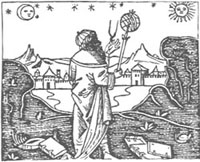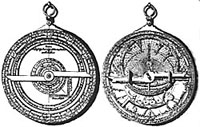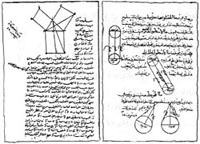|
The Arabs invented and developed Algebra and made revolutionary strides in trigonometry. Al-Khwarizmi, credited with the invention of Algebra, was inspired by the need to find a more accurate and comprehensive method to assure the precise divisions of land so that the Koran could be speci�fically obeyed in the laws of inheritance. The Astrolabe, combining the use of mathematics, geography and astronomy was also devised with religion in view, and was used to chart exactly the time of sunrise and sunset, to determine the time for fasting during the month of Ramadan. The writings of Leonardo da Vinci, Leonardo Fibonacci of Pisa and Master Jacob of Florence show the Arab influence on mathematical studies in European universities.26 The reformation of the calendar, with a margin of error of only one day in five thousand years was also a contribution of the Arab intellect. Indeed, in our every day commerce, whether it is in yard goods, lumber, or ingots of gold and silver, we use the weights and measures by which the Arabs of the past conducted the business of their every day life. Astronomy Beside the improvement of the ancient Astrolabe, the Arab astronomers of the Middle Ages compiled astronomical charts and tables, in observatories such as those at Palmyra and Maragha. Gradually, they were able to deter�mine the length of a degree, to establish longitude and latitude, and to investigate the relative speeds of sound and light. Al-Biruni, considered one of the greatest scientists of all time discussed the possibility of the earth's rotation on its own axis, a theory proven by Galileo six hundred years later. Arab astronomers such as Al Fezari, Al-Farghani, and Al-Zarqali added to the works of Ptolemy and the classic pioneers, in the development of the magnetic compass and the charting of the Zodiac.
| ||||||||
|
|
||||||||


